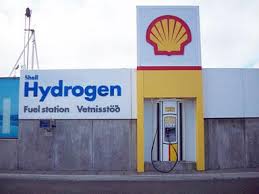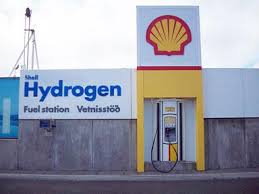
As a means of encouraging greater adoption of hydrogen powered fuel-cell electric vehicles, petrol stations around Europe will soon begin to offer hydrogen fuel pumps alongside their standard unleaded and diesel options.
On Tuesday, Shell announced to install a huge nationwide network of 400 hydrogen fueling pumps at petrol stations around Germany after having agreed in September to set a small pilot program of a similar nature in the UK where hydrogen will be sold from three petrol forecourts in south east England. The company said that the success of the two above projects would lead the company to examine and decide on offering similar facilities and products in the USA, UK, France, Belgium, the Netherlands and several other countries in Europe.
The case of hydrogen vehicle as "a chicken and egg situation" for the oil and natural gas producing companies with FCEVs only becoming attractive to customers if there is a refueling infrastructure in place. On the other hand without enough FCEV customers, it would not be commercially attractive to establishing and maintaining investments in fueling infrastructure.
On Tuesday, London took delivery of a dozen new zero-emission vehicles from Toyota, by hydrogen fuel cells made by UK-based ITM Power and this is one of the reasons that London is considered as a key test-bed for the UK hydrogen economy. At the same time, a visit to the Japanese headquarters of the car manufacturer on the same day by the Mayor of London Boris Johnson.
Even while possessing a comparable driving range, speed and refueling time compared to normal cars, hydrogen powered vehicles emit no emissions from the exhaust pipe but just water vapor.
While hydrogen is an abundant element, not much of it exists in the pure, compressed form that fuel cells require, which means it must be extracted from other compounds such as water or methane.
Shell noted electricity to make hydrogen though electrolysis is one way of potentially absorbing surplus wind and solar energy at times of low power demand since the CO2 footprint of hydrogen produced from electricity - via electrolysis with water - depends on the CO2 intensity of the power source.
To progress the commercialization of hydrogen in Germany, a joint venture called H2 Mobility Deutschland that comprises of Air Liquide, Daimler, Linde, OMV, Shell and Total has been designed.
Shell is actively developing means to increase the production of hydrogen as it is viewed as one of the many options to reduce emissions from transport.
“H2 Mobility Germany shows what we can achieve through close collaboration between governments and business. The next step is for consumers to embrace this opportunity and consider buying hydrogen vehicles as they become available," said Oliver Bishop, Shell's general manager of hydrogen.
Shell currently operates three hydrogen stations in Germany, including one in Berlin and two in Hamburg, apart from its three in the south east of England. Pumps refuel hydrogen fuel cell electric vehicles (FCEV) in a few minutes at these hydrogen filling stations.
(Source:www.digitallook.com)
On Tuesday, Shell announced to install a huge nationwide network of 400 hydrogen fueling pumps at petrol stations around Germany after having agreed in September to set a small pilot program of a similar nature in the UK where hydrogen will be sold from three petrol forecourts in south east England. The company said that the success of the two above projects would lead the company to examine and decide on offering similar facilities and products in the USA, UK, France, Belgium, the Netherlands and several other countries in Europe.
The case of hydrogen vehicle as "a chicken and egg situation" for the oil and natural gas producing companies with FCEVs only becoming attractive to customers if there is a refueling infrastructure in place. On the other hand without enough FCEV customers, it would not be commercially attractive to establishing and maintaining investments in fueling infrastructure.
On Tuesday, London took delivery of a dozen new zero-emission vehicles from Toyota, by hydrogen fuel cells made by UK-based ITM Power and this is one of the reasons that London is considered as a key test-bed for the UK hydrogen economy. At the same time, a visit to the Japanese headquarters of the car manufacturer on the same day by the Mayor of London Boris Johnson.
Even while possessing a comparable driving range, speed and refueling time compared to normal cars, hydrogen powered vehicles emit no emissions from the exhaust pipe but just water vapor.
While hydrogen is an abundant element, not much of it exists in the pure, compressed form that fuel cells require, which means it must be extracted from other compounds such as water or methane.
Shell noted electricity to make hydrogen though electrolysis is one way of potentially absorbing surplus wind and solar energy at times of low power demand since the CO2 footprint of hydrogen produced from electricity - via electrolysis with water - depends on the CO2 intensity of the power source.
To progress the commercialization of hydrogen in Germany, a joint venture called H2 Mobility Deutschland that comprises of Air Liquide, Daimler, Linde, OMV, Shell and Total has been designed.
Shell is actively developing means to increase the production of hydrogen as it is viewed as one of the many options to reduce emissions from transport.
“H2 Mobility Germany shows what we can achieve through close collaboration between governments and business. The next step is for consumers to embrace this opportunity and consider buying hydrogen vehicles as they become available," said Oliver Bishop, Shell's general manager of hydrogen.
Shell currently operates three hydrogen stations in Germany, including one in Berlin and two in Hamburg, apart from its three in the south east of England. Pumps refuel hydrogen fuel cell electric vehicles (FCEV) in a few minutes at these hydrogen filling stations.
(Source:www.digitallook.com)





